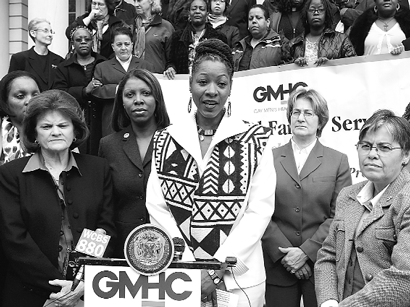Dr. Marjorie Hil will lead effort to combat the epidemic’s shifting demographics
Health care administrators, their clients and elected officials gathered on the steps of City Hall on November 22 to launch the Gay Men’s Health Crisis (GMHC) Women’s Institute, to focus on the rising rates of HIV infection in women of color.
Dr. Marjorie J. Hill, Ph.D., former assistant commissioner of HIV/AIDS Services at the New York City Department of Health and Mental Hygiene, has been appointed as director.
“I am thrilled, honored, pleased, ecstatic… to be standing proudly with some of the finest leadership our city has,” said Hill. “New York City had as of December 30, 2003, 27,000 women living with HIV/AIDS.”
Hill continued, “Of those, 90 percent are African American and Latina. This city can do better, it must do better, and with the combined support of the elected officials and the community-based organizations, we will do better.”
Hill said the Women’s Institute will increase HIV testing among women of color and launch citywide marketing campaigns that reflect the reality of many women’s lives as sole breadwinners and caretakers.
“I am eager to come before you with our success, because we will succeed,” Hill insisted. “The women of New York—those who are not infected as well as those who are—really demand and require that our government, community, that we all do better.”
The Women’s Institute is not intended as a one-stop treatment center, but rather an organization dedicated to fund-raising, public policy and partnering with pre-existing service organizations.
Ana Oliveira, GMHC’s executive director, vowed that, “With our sister organizations we will be moving public policy items with the goal of dealing with all social and economic conditions that create the vulnerability that put women at such high risk for HIV infection.”
“As you know, a lot of women leave Harlem, Brooklyn and the Bronx to come to GMHC, because of the anonymity and safety, and that will continue to go on,” Oliveira told Gay City News after the press conference. “But we wanted to enhance the services in the Bronx, in Harlem, in Brooklyn so that those who are comfortable to be there can go there, so that there is more prevention contained, so that the stigma goes down.”
As she concluded her public remarks, Oliveira introduced Gwen Carter, executive director of Lifeforce, a service provider for women with HIV, most of them women of color, who applauded GMHC “for recognizing the need for the creation of a new paradigm to address the issues of women and HIV/AIDS. We think that Dr. Marjorie Hill is the perfect person to spearhead this effort, and we at Lifeforce are ecstatic about being a part of the process.”
Numerous elected officials spoke to their commitment toward the project’s success and about HIV prevention efforts in the city generally, including Public Advocate Betsy Gotbaum, City Councilwomen Margarita Lopez (D-Manhattan), Letitia James (D-Brooklyn) and Melinda Katz (D-Queens) and State Assemblymembers Richard Gottfried and Deborah Glick, both Manhattan Democrats.
“About two years ago I issued a report on the status of women and AIDS and I was very disturbed about the lack of media attention to this report which pointed out that the leading cause of death among women aged 25 to 34 is AIDS,” said Gotbaum. “People think AIDS has gone away.”
The public advocate lauded GMHC’s past work, and vowed, “We are here to support you 100 percent, and do anything we can to help you go forward with this great Institute.”
Lopez, chair of the City Council’s Committee on Mental Health, Mental Retardation and Substance Abuse said, “When the HIV infection showed its ugly face in our city, the gay, lesbian, transgender, bisexual community took power, moved forward and created an incredible organization to fight back. When nobody wanted to fight for us, we fought for ourselves, and we took over the issue.”
The City Council currently appropriates $8 million for New York City’s HIV prevention efforts in communities of color, and James announced an initiative to work with other legislators, including the Black, Puerto Rican and Asian caucus, to secure an additional $10 million set-aside specifically to combat HIV among women of color.
No specific city funds for the new Women’s Institute at GMHC were discussed at the press conference.
During her remarks, Katz stressed the need for further education and preventative health care, while Gottfried underscored the importance of funding.
“Well over a decade ago, the Legislature in Albany began targeting funding in the state AIDS institute for programs dealing with HIV, targeted at women of color,” Gottfried said. “That funding needs to grow. Every year we put money into the budget for HIV, the governor takes it out.”
Glick noted that in the battle for adequate health care, communities of color were often at the forefront, saying, “That is a battle that we will continue to fight. We will fight it now with one of the most potent weapons one could possible have and that is Marjorie Hill, in combination with GMHC.”
Glick also spoke to the need for the school system to educate children about the dangers of HIV infection.
Glick said, “I think that the GMHC has over the years moved with the epidemic and its historic place being the first organization to confront the AIDS crisis. It is fitting that it also be in the forefront of establishing this Women’s Institute.”
GMHC’s Lesbian AIDS Project (LAP) celebrated its tenth anniversary in December 2002. Oliveira said its longstanding mission to reach out to a broader base of women living with HIV will be better accomplished within the auspices of the Women’s Institute, of which LAP will now be a part.
“One of the things we think the Institute will do is really raise that issue,” said Oliveira. “It’s going to increase the visibility of this issue, for lesbians and for straight women.”


































